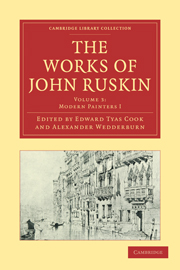Book contents
- Frontmatter
- Contents
- LIST OF ILLUSTRATIONS
- INTRODUCTION TO THIS VOLUME
- BIBLIOGRAPHICAL NOTE
- MODERN PAINTERS VOLUME I
- AUTHOR'S PREFACE TO FIRST EDITION (1843)
- AUTHOR'S PREFACE TO SECOND EDITION (1844)
- AUTHOR'S PREFACE TO THIRD EDITION (1846)
- AUTHOR'S PREFACE TO NEW EDITION (1873)
- AUTHOR'S SYNOPSIS OF CONTENTS
- PART I OF GENERAL PRINCIPLES
- SECTION I OF THE NATURE OF THE IDEAS CONVEYABLE BY ART
- SECTION II OF POWER
- PART II OF TRUTH
- SECTION I GENERAL PRINCIPLES RESPECTING IDEAS OF TRUTH
- CHAPTER I OF IDEAS OF TRUTH IN THEIR CONNECTION WITH THOSE OF BEAUTY AND RELATION
- CHAPTER II THAT THE TRUTH OF NATURE IS NOT TO BE DISCERNED BY THE UNEDUCATED SENSES
- CHAPTER III OF THE RELATIVE IMPORTANCE OF TRUTHS:—FIRST, THAT PARTICULAR TRUTHS ARE MORE IMPORTANT THAN GENERAL ONES
- CHAPTER IV OF THE RELATIVE IMPORTANCE OF TRUTHS:—SECONDLY, THAT RARE TRUTHS ARE MORE IMPORTANT THAN FREQUENT ONES
- CHAPTER V OF THE RELATIVE IMPORTANCE OF TRUTHS:—THIRDLY, THAT TRUTHS OF COLOUR ARE THE LEAST IMPORTANT OF ALL TRUTHS
- CHAPTER VI RECAPITULATION
- CHAPTER VII GENERAL APPLICATION OF THE FOREGOING PRINCIPLES
- SECTION II OF GENERAL TRUTHS
- SECTION III OF TRUTH OF SKIES
- SECTION IV OF TRUTH OF EARTH
- SECTION V OF TRUTH OF WATER
- SECTION VI OF TRUTH OF VEGETATION.—CONCLUSION
- Appendix
- Plate section
CHAPTER II - THAT THE TRUTH OF NATURE IS NOT TO BE DISCERNED BY THE UNEDUCATED SENSES
Published online by Cambridge University Press: 07 September 2011
- Frontmatter
- Contents
- LIST OF ILLUSTRATIONS
- INTRODUCTION TO THIS VOLUME
- BIBLIOGRAPHICAL NOTE
- MODERN PAINTERS VOLUME I
- AUTHOR'S PREFACE TO FIRST EDITION (1843)
- AUTHOR'S PREFACE TO SECOND EDITION (1844)
- AUTHOR'S PREFACE TO THIRD EDITION (1846)
- AUTHOR'S PREFACE TO NEW EDITION (1873)
- AUTHOR'S SYNOPSIS OF CONTENTS
- PART I OF GENERAL PRINCIPLES
- SECTION I OF THE NATURE OF THE IDEAS CONVEYABLE BY ART
- SECTION II OF POWER
- PART II OF TRUTH
- SECTION I GENERAL PRINCIPLES RESPECTING IDEAS OF TRUTH
- CHAPTER I OF IDEAS OF TRUTH IN THEIR CONNECTION WITH THOSE OF BEAUTY AND RELATION
- CHAPTER II THAT THE TRUTH OF NATURE IS NOT TO BE DISCERNED BY THE UNEDUCATED SENSES
- CHAPTER III OF THE RELATIVE IMPORTANCE OF TRUTHS:—FIRST, THAT PARTICULAR TRUTHS ARE MORE IMPORTANT THAN GENERAL ONES
- CHAPTER IV OF THE RELATIVE IMPORTANCE OF TRUTHS:—SECONDLY, THAT RARE TRUTHS ARE MORE IMPORTANT THAN FREQUENT ONES
- CHAPTER V OF THE RELATIVE IMPORTANCE OF TRUTHS:—THIRDLY, THAT TRUTHS OF COLOUR ARE THE LEAST IMPORTANT OF ALL TRUTHS
- CHAPTER VI RECAPITULATION
- CHAPTER VII GENERAL APPLICATION OF THE FOREGOING PRINCIPLES
- SECTION II OF GENERAL TRUTHS
- SECTION III OF TRUTH OF SKIES
- SECTION IV OF TRUTH OF EARTH
- SECTION V OF TRUTH OF WATER
- SECTION VI OF TRUTH OF VEGETATION.—CONCLUSION
- Appendix
- Plate section
Summary
The common self-deception of men with respect to their power of discerning truth.
It may be here inquired by the reader, with much appearance of reason, why I think it necessary to devote a separate portion of the work to the showing of what is truthful in art. “Cannot we”, say the public, “see what nature is with our own eyes and find out for ourselves what is like her?” It will be as well to determine this question before we go farther, because if this were possible, there would be little need of criticism or teaching with respect to art.
Now I have just said that it is possible for all men, by care and attention, to form a just judgment of the fidelity of artists to nature. To do this no peculiar powers of mind are required, no sympathy with particular feelings, nothing which every man of ordinary intellect does not in some degree possess,—powers, namely, of observation and intelligence, which by cultivation may be brought to a high degree of perfection and acuteness. But until this cultivation has been bestowed, and until the instrument thereby perfected has been employed in a consistent series of careful observations, it is as absurd as it is audacious to pretend to form any judgment whatsoever respecting the truth of art: and my first business, before going a step farther, must be to combat the nearly universal error of belief among the thoughtless and unreflecting, that they know either what nature is, or what is like her; that they can discover truth by instinct, and that their minds are such pure Venice glass as to be shocked by all treachery.
- Type
- Chapter
- Information
- The Works of John Ruskin , pp. 140 - 148Publisher: Cambridge University PressPrint publication year: 2010First published in: 1903



